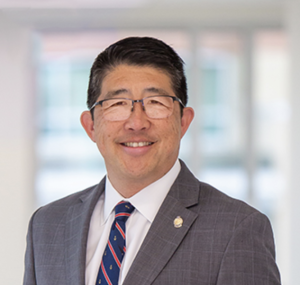Beebe Healthcare was honored to welcome Gov. Matt Meyer Nov. 12, as he presented Delaware’s application for up to $1 billion from the Rural Health Transformation Fund. During a press conference held in the Margaret H. Rollins School of Nursing on the Lewes Campus, the governor unveiled a robust proposal compiling 15 key projects, programs and initiatives that aim to dramatically strengthen healthcare access, affordability and the healthcare workforce in rural southern Delaware and across our state.
Beebe was proud to host the governor during this pivotal moment as he presented his proposal, which lays out a bold vision to create pathways to permanently change the rural healthcare delivery landscape and workforce in Delaware, improving the health and well-being of all residents and caregivers for generations to come.
For nearly 110 years, Beebe has been on its own journey of transformation. Since 1916, when two brothers from Lewes returned home after receiving their medical degrees from Jefferson Medical College in Philadelphia to establish Beebe Hospital, their legacy has been our mission: to bring high-quality, compassionate medical care to the people of Sussex County.
In the past five years alone, we have introduced advanced heart care at our new Cardiovascular Institute, comprehensive cancer services at two cancer centers, and increased stroke and neurologic treatments alongside world-class partnerships.
Beebe is deeply committed to keeping care in Sussex County, so our patients can now stay close to their family and communities while receiving the services they need and deserve. To make that possible, we’re expanding our modern facilities throughout Sussex County for patients to receive care in convenient offices, hospitals, emergency rooms and cancer centers.
And we just invested in innovative tools like MyChart, the most advanced version of Epic. This platform is an electronic medical record that links all Beebe services to patients and their families through MyChart and was built specifically for the diverse needs of Sussex County’s growing community.
This progress, while challenging, is the result of our collaborating with the community to advance care and the dedication, teamwork and passion of nearly 3,000 Beebe team members who show up every day to serve our patients. Thank you for your continued support.
With the confluence of an aging community, rapidly expanding population and a national shortage of physicians, advanced practice clinicians and healthcare workers after the pandemic, Beebe Healthcare and Sussex County are truly at ground zero of the rural healthcare crisis that grips many parts of our nation. As we continue to grow and innovate, we are focused on promoting wellness, preventing illness and providing healing through expanded ambulatory services and community-based care. This is at the heart of all we do for Sussex County.
Gov. Meyer’s proposed initiatives, such as Rural Community Health Hubs, the Rural Diabetes Wellness Program and expanded School-Based Health Centers, closely align with Beebe’s long-standing priorities as a rural healthcare system. And we applaud the efforts to expand the healthcare workforce through educational programs, as we have also worked tirelessly to grow our residency programs and actively explore the exciting possibility of bringing a medical school to Sussex County.
Beebe Healthcare is, and always has been, your local, nonprofit rural community health system. For more than a century, we’ve cared for our neighbors with compassion and commitment. We stand at the ready to support the initiatives presented this past week by Gov. Meyer and look forward to actively engaging in delivering transformational care to the people who call Delaware home.






















































